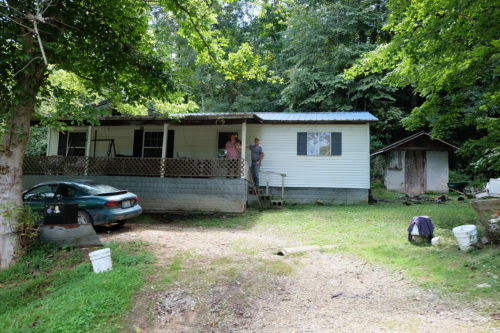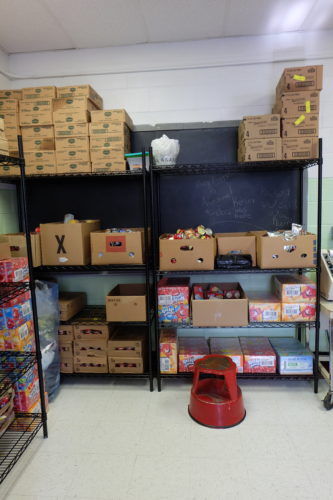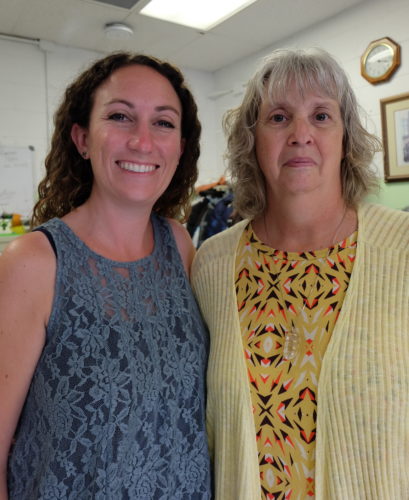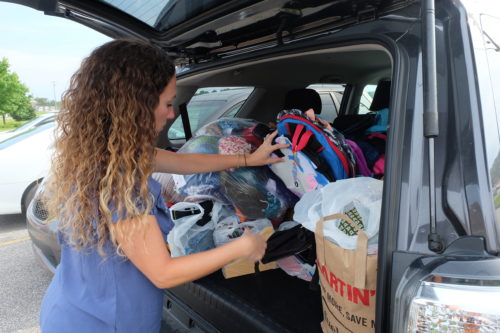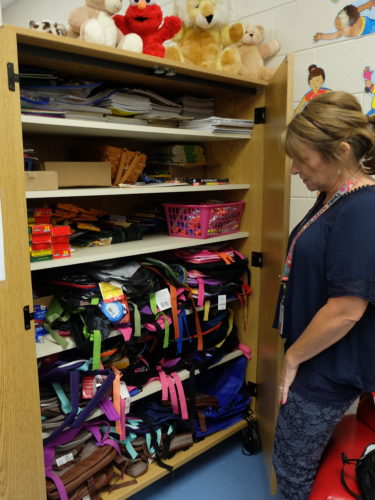After two days of visiting our affiliated schools in Lawrence County, Kentucky, U.S. Projects Specialist Shelley Oxenham and I traveled about an hour south to Floyd County to meet with a new Volunteer Coordinator, Scott Shannon, as well as to visit with a long-term coordinator, Sharon Collins, who had recently been transferred to a new school.
Although Scott was brand new to the Children Incorporated program and Sharon was not, since they were both new to their respective schools this year, each of them was meeting the children for the first time, many of whom they found would greatly benefit from having a sponsor.

With newly enrolled children, new sponsors are needed.
Scott is the Resource Center Coordinator for both James A. Duff Elementary School and Allen Central Middle School, which share the same building. The elementary school classrooms are on the first floor of the building, and the middle school classrooms are on the second floor.
Scott just started his position at the beginning of July. He has had a busy school year starting his new position – as a former football coach in the school system, not only is he learning the ropes as a coordinator, but he is also meeting the more than 600 children that attend the two schools for the first time.
Scott talked to Shelley and me about how many of the children who attend the schools come from families with financial problems, and how many of them are living with their grandparents, because their parents aren’t able to support them. A long-time resident of the area, Scott has seen a lot of people struggle to find work because many businesses in town have closed over the years.
Sometimes new shoes are not enough
When the school year started just a few weeks prior, Scott told us that he had given a lot of clothes away to children – more than he had ever anticipated. He was surprised by just how many kids came the first week of school in old, dirty clothes, wearing shoes with holes and broken flip-flops. He is just getting to know many of them, and is already sending food home with seventeen children on the weekends, because he worries they won’t eat otherwise. Scott says his greatest need right now is for more clothes for the kids, especially bigger clothes for the middle school-aged kids.
Before we left, Scott introduced us to six siblings who all attend the schools – four of the children are currently sponsored through our program, but two, Mark* and James*, are still waiting to be sponsored. Scott said that this family really needs additional support beyond what the Resource Center can provide; he already gave each of the kids new shoes at the beginning of the school year, thanks to a shoe drive held by community members.
He was surprised by just how many kids came the first week of school in old, dirty clothes, wearing shoes with holes and broken flip-flops.
Scott would love to see all of the kids have sponsors because he knows how much it would help them in getting school supplies year-round, and holiday gifts and coats in the winter.
No money to help kids
After leaving James A. Duff Elementary School and Allen Central Middle School, we visited with one of our long-term coordinators, Sharon, at May Valley Elementary School. Sharon was our coordinator at a high school in Kentucky for many years, until she was transferred to the elementary school in May. Although she is an experienced coordinator, like Scott, she is only getting to know the children at her new school.
Sharon told us that when she arrived at the school, she was given very little money to purchase items for the Resource Center, and what she was given had to last the whole year. Once her funds – which were to supply everything from clothes to food, to shoes, to school supplies – ran out, she would have to rely on donations from the community and support from our sponsorship program to get the children the help they need.
She said that the elementary school serves three housing projects in the county, and that even though she gets help from a great partnering organization in town that has a clothing closet and provides book bags at the beginning of the school year and blankets at Christmas, there are just so many more kids that she knows need assistance.

Our coordinators would love to see more of their students get sponsored.
Siblings with a lot of love
Sharon has enrolled eleven children in our program so far, but she wants to add close to twenty more kids – an ambitious and admirable goal. She first started by enrolling a family of five children – three boys and two girls – who all attend May Valley, and whose parents are struggling to support them. Sharon told us that one of the girls broke her glasses months ago, but her parents don’t have the money to replace them – and the girl is still in need of new ones now.
Like the family we met with Scott, these children are also very close in age to one another. But unlike that same family, all five of the children at Sharon’s school are currently waiting for sponsors.
Sharon took us around the school to pull the kids out of their classrooms so we could meet with all the siblings in the Resource Center. We stopped by the youngest boy’s classroom first, and when we told him we were going to get his brothers and sisters, he became incredibly animated. Even though he had seen them just a few hours before, he was so excited to get to see them in the middle of the school day.
As we continued down the hallways, and each child joined us, I could tell that this is a close-knit group of siblings who really watches out for one another. They held hands as they walked, and the older ones stopped to tie the younger ones’ shoes. It was sweet to see them together, and I was glad to know they had one another. Although they were lacking many things they needed, it was apparent they were not lacking in love for one another.
*Names changed for children’s protection.
***
HOW DO I SPONSOR A CHILD IN KENTUCKY?
You can sponsor a child in Kentucky in one of two ways: call our office at 1-800-538-5381 and speak with one of our staff members, or email us at sponsorship@children-inc.org.


